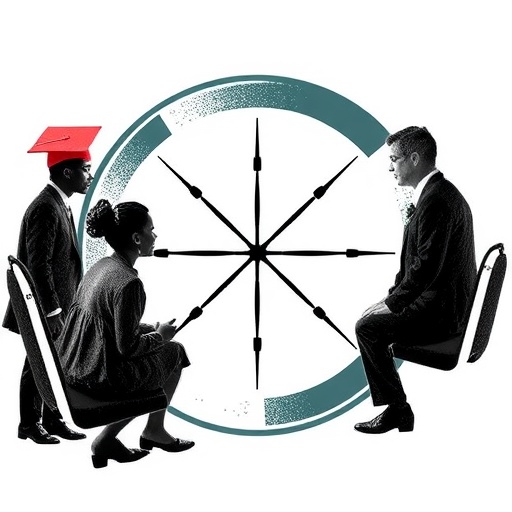In a rapidly evolving educational landscape, the role of professional staff within universities is coming under scrutiny, particularly in terms of their influence on established academic norms. A new study from the Netherlands, authored by researchers de Jong and Kantimm, explores this complex issue, posing pivotal questions regarding the traditional power dynamics in academic institutions. The work seeks to clarify whether these non-academic professionals, often seen as back-office support, are indeed capable of instigating meaningful challenges to the entrenched scholarly practices.
The landscape of higher education has changed considerably in the last several decades. The growing complexity of academic environments has necessitated the diversification of roles within universities. Professional staff, consisting of administrative personnel, IT specialists, and student services workers, are increasingly entrusted with responsibilities that intersect with academic functions. However, questions remain: Are these individuals merely facilitators of academic processes, or do they possess the agency to influence academic norms and practices actively?
The research findings suggest that professional staff can and do challenge academic norms, albeit in nuanced ways. The study identifies several pathways through which these staff members exert influence, revealing that their insights and experiences often bridge the gap between administrative policies and academic realities. However, the authors caution that while these individuals may possess the potential to effect change, structural barriers frequently inhibit their ability to do so effectively.
One of the significant findings of this research is the emergence of informal power structures within universities. While formal authority tends to reside with faculty members, professional staff often hold critical knowledge regarding the day-to-day operations of academic environments. Their unique positions enable them to advocate for changes in practices that could enhance student experiences and institutional efficiency. Such advocacy is instrumental in fostering a more inclusive academic culture that values input from all stakeholders.
Moreover, the study highlights that professional staff can challenge existing norms by advocating for evidence-based practices. In today’s data-driven world, the ability to analyze and interpret data has become a crucial skill set within universities. Professional staff equipped with these capabilities can leverage their expertise to influence policy changes and encourage the adoption of innovative pedagogical approaches. This not only enhances the learning environment but also promotes a culture of continuous improvement within academic institutions.
Indeed, the integration of professional staff in the decision-making process is increasingly being recognized as vital for fostering a more holistic educational experience. By inviting diverse perspectives into discussions about curriculum design and student engagement strategies, universities can benefit from a more rounded approach to education. Such integrative efforts may lead to the development of programs that are more responsive to the needs of students and faculty alike.
However, despite these promising developments, the path to challenging academic norms is fraught with obstacles. Institutional cultures that prioritize traditional power dynamics often undermine the potential of professional staff to contribute meaningfully to academic discourse. The authors argue that to unlock the full potential of these individuals, universities must foster an environment that encourages collaboration among all stakeholders, regardless of their formal titles or roles.
The study also posits that expanding the recognition of professional staff’s contributions can lead to greater job satisfaction and professional growth. When these individuals feel empowered to participate in decision-making processes, they are more likely to invest in their roles and engage in initiatives that benefit the wider academic community. This sense of ownership can rejuvenate their commitment to the institution, ultimately improving overall organizational efficacy.
Furthermore, the research underlines the importance of professional development opportunities for non-academic staff. By investing in training programs that elevate their skill sets and enhance their understanding of academic norms, universities can better equip professional staff to participate in governance and policy discussions. This investment not only benefits the individuals involved but can also elevate the quality of academic governance across the institution.
The findings of this study open up new avenues for understanding the dynamics of power within academic institutions. They challenge the conventional view that teaching and research should be the sole province of faculty members. By recognizing that professional staff can contribute to academic excellence, institutions may establish a more collaborative and integrated approach to education that values all voices and perspectives.
In conclusion, this research highlights an essential shift in how we understand the role of professional staff within academic settings. By challenging traditional power systems and advocating for evidence-based practices, these individuals can significantly influence the landscape of higher education. Institutions must adapt to these changes by fostering inclusive environments that empower all stakeholders to play a role in shaping the future of academic inquiry and educational practice.
As universities continue to evolve, the potential of professional staff to challenge and redefine academic norms cannot be overlooked. Embracing a culture that values diverse contributions will not only enhance institutional effectiveness but can also lead to rich educational experiences for students. The insights presented by de Jong and Kantimm underscore the necessity for ongoing dialogue and exploration of these dynamics, ultimately paving the way for a more equitable approach to shaping the future of higher education.
Subject of Research: Influence of Professional Staff on Academic Norms in Universities
Article Title: Correction to: Do professional staff in universities really challenge academic norms? A perspective from the Netherlands.
Article References:
de Jong, S., Kantimm, W. Correction to: Do professional staff in universities really challenge academic norms? A perspective from the Netherlands. High Educ (2025). https://doi.org/10.1007/s10734-025-01554-5
Image Credits: AI Generated
DOI:
Keywords: Higher education, professional staff, academic norms, influence, institutional culture, collaboration, empowerment.




